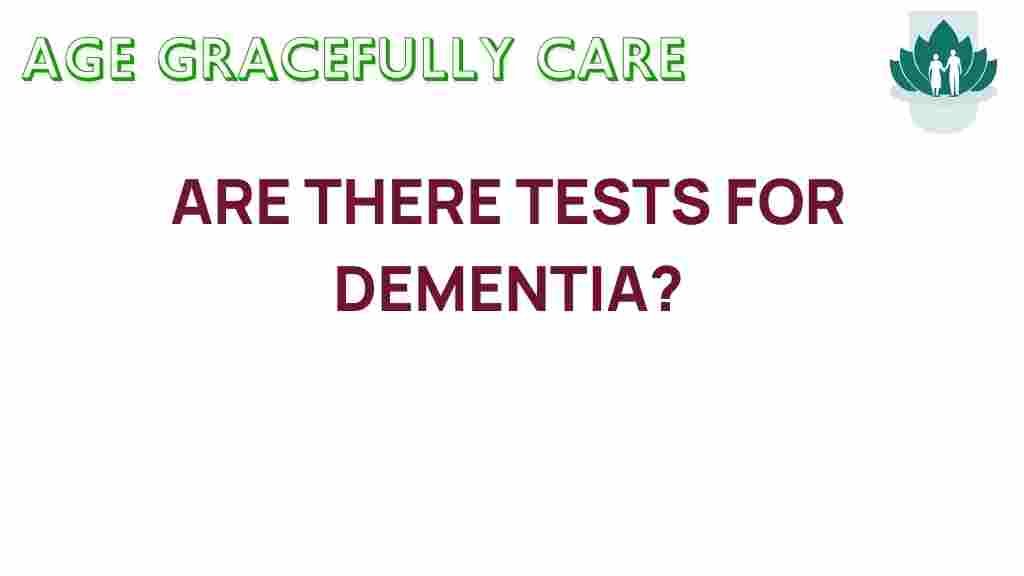Unraveling the Mystery: Are There Tests for Dementia?
Dementia is a term that describes a range of cognitive impairments that interfere with daily life. Understanding whether someone is experiencing dementia involves a series of evaluations known collectively as dementia tests. These tests can help health professionals determine the type of cognitive decline and plan appropriate interventions. In this article, we will delve into the various types of dementia tests, their significance in Alzheimer’s diagnosis, and the importance of early detection for maintaining brain health.
The Importance of Early Detection
Early detection of dementia is crucial for several reasons:
- Intervention Opportunities: Identifying cognitive decline early allows for timely interventions that may slow progression.
- Planning for the Future: Early diagnosis provides individuals and families the chance to make informed decisions regarding care and support.
- Access to Resources: Early diagnosis connects patients with resources and support networks that can ease the burden of mental decline.
Understanding Dementia Tests
Dementia tests encompass a variety of assessments designed to evaluate cognitive function and memory. These tests can be categorized into several types, each serving different purposes in the assessment process.
Cognitive Assessment
A cognitive assessment is typically the first step in the diagnostic process. It evaluates various cognitive domains, including memory, attention, language, and problem-solving skills. Common components of cognitive assessments include:
- Mini-Mental State Examination (MMSE): A brief 30-point questionnaire that assesses cognitive function.
- Cognitive Abilities Screening Instrument (CASI): A more comprehensive tool that looks at multiple cognitive areas.
- Montreal Cognitive Assessment (MoCA): A quick screening tool for mild cognitive impairment.
Memory Evaluation
Memory evaluations are critical in assessing for dementia. Doctors may use specific tests to evaluate short-term and long-term memory recall. These can include:
- Word List Recall: The patient is asked to remember a list of words after a few minutes.
- Story Recall: The patient listens to a short story and is asked to recall details later.
Neuropsychological Tests
Neuropsychological tests involve more comprehensive assessments conducted by psychologists to evaluate various cognitive functions. These tests can help differentiate between different types of dementia and other psychological conditions. Key aspects of these tests include:
- Executive Functioning: Tests that measure planning, organization, and problem-solving abilities.
- Language Skills: Assessments of vocabulary, comprehension, and verbal fluency.
- Visual-Spatial Skills: Tasks that gauge the ability to understand and remember the spatial relationships between objects.
Physical and Laboratory Tests
In addition to cognitive assessments, physical exams and laboratory tests are often necessary to rule out other conditions that may mimic dementia symptoms. These may include:
- Blood Tests: To check for vitamin deficiencies, thyroid issues, and infections.
- Brain Imaging: MRI or CT scans can help identify structural changes in the brain.
Step-by-Step Process of Dementia Testing
Understanding the process of undergoing dementia tests can help ease concerns. Here’s a typical step-by-step outline:
Step 1: Initial Consultation
The process begins with an initial consultation with a healthcare provider who specializes in cognitive health. During this appointment, the provider will:
- Discuss any cognitive concerns or symptoms.
- Gather medical history and family history.
- Conduct a physical examination.
Step 2: Cognitive Testing
Following the initial consultation, the patient will undergo a series of dementia tests focused on cognitive assessment. This may take place in a clinic or through telehealth services.
Step 3: Additional Evaluations
If cognitive tests indicate potential issues, further evaluations, including neuropsychological tests and possibly brain imaging, will be scheduled.
Step 4: Diagnosis and Discussion
Once all tests are completed, the healthcare provider will discuss the results with the patient and their family. If dementia is diagnosed, the provider will outline available treatment options and support resources.
Troubleshooting Tips for Patients and Families
Undergoing dementia tests can be overwhelming. Here are some troubleshooting tips to help patients and their families navigate this process:
- Prepare Questions: Write down any questions or concerns before appointments to ensure all topics are covered.
- Keep a Journal: Document any changes in memory or behavior leading up to the evaluation to provide accurate information to healthcare providers.
- Seek Support: Involve family members or friends in the process for emotional support and to help remember important details from consultations.
- Research Resources: Look into local support groups and educational resources about dementia for additional guidance.
The Role of Brain Health in Dementia Prevention
Maintaining good brain health can play a significant role in reducing the risk of dementia. Here are some strategies to promote brain health:
- Engage in Regular Physical Activity: Exercise increases blood flow to the brain and promotes overall health.
- Maintain a Balanced Diet: Eating a diet rich in fruits, vegetables, whole grains, and healthy fats supports brain function.
- Stay Mentally Active: Engage in activities that challenge the brain, such as puzzles, reading, or learning new skills.
- Socialize: Maintaining social connections can stave off feelings of isolation and support cognitive health.
Conclusion
In conclusion, dementia tests are essential tools in the early detection and diagnosis of cognitive decline, including Alzheimer’s diagnosis. By understanding the various assessments available, patients and families can approach the process with clarity and preparedness. Early detection can lead to timely interventions that may help maintain brain health and improve quality of life. If you or a loved one is experiencing symptoms of memory decline, consult a healthcare provider for evaluation and support. For more information on brain health and cognitive assessments, you can visit this resource or explore local support networks through this link.
This article is in the category Health and created by AgeGracefullyCare Team
